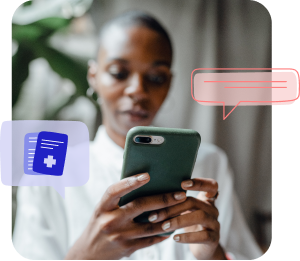Zoom has become one of the most widely used video conferencing platforms, with an explosion in growth during the COVID-19 pandemic. However, when it comes to handling sensitive healthcare information, concerns about personal health information (PHI) security and compliance with the Health Insurance Portability and Accountability Act (HIPAA) have arisen. So, is Zoom HIPAA compliant? In this blog, we will explore the topic of the platform’s compliance with the HIPAA Privacy Rule, discuss what businesses need to know, and present alternatives to Zoom for maintaining compliance with HIPAA regulations.
What to know about Zoom and HIPAA requirements
For healthcare providers and businesses in the healthcare industry, safeguarding protected health information is incredibly important. When considering using the platform for telehealth purposes or any healthcare-related purposes, it is crucial to have a clear understanding of the software’s compliance status.

So, is Zoom HIPAA compliant?
Yes. Zoom does have a plan specifically for doctors to remain compliant. However, there is much to consider when deciding between telehealth or video visit platforms in terms of security. That is not to say that the platform is without security flaws. In fact, half a million accounts were compromised and sold on the dark web back in 2020.
It is anticipated that, as telehealth skyrocketed 6,000% in usage during the pandemic, that it will grow another 28% by 2026. Being aware of what is available to you as a healthcare practice can give you a significant advantage in early adoption and enhance your opportunities for growth.

HIPAA Compliant Telehealth Visits
Video visit with patients with OhMD, a HIPAA compliant solution.
What is Zoom for Healthcare?
Newsflash!
It is not a good idea to simple open a free Zoom account and fire up video visit with a patient. There are special tools for that to keep you and your patient safe.
Zoom for Healthcare is a specialized version of the video conferencing platform that is intended for use by healthcare providers to protect ePHI. It offers certain features and controls that can help healthcare practices meet their compliance requirements.

The plan provides features such as end-to-end encryption, a HIPAA Business Associate Agreement (BAA), and secure cloud storage for recording and storing video sessions.
These features are designed to enhance the security and privacy of patient information.
Compliance is a shared responsibility
Using Zoom for Healthcare does not automatically make your organization HIPAA compliant. HIPAA compliance is a shared responsibility between your telehealth platform and your organization.
While using the correct version of the software is certainly important, a healthcare practice needs to understand that it is also on their staff to ensure HIPAA compliance.
Sign up for this plan doesn’t simply check the box answering “Is Zoom HIPAA compliant?”

Your organization must be diligent in internally verifying you have protocols in place to ensure are protecting ePHI and can continue to do so.
Additional steps and considerations are necessary to ensure ePHI security and compliance, including the use of the solution’s end-to-end encryption available for Zoom’s Meetings and Video Webinars, not for the plans Phone or Chat options.
Storage, access, security and more
Zoom for Healthcare offers secure cloud storage for recording and storing video sessions. This feature allows providers to securely store patient consultations, telemedicine appointments, and other video conferences. The recordings are protected from unauthorized access and can only be accessed by authorized personnel within the healthcare organization.
When storing patient data, it’s crucial to have a clear policy for retaining recordings. The platform offers recording features that allow users to store meetings in the cloud or locally. Make sure these features align with your organization’s data retention policies as required by HIPAA privacy rules.
It is crucial that you consider the security of devices used to access this telehealth tool. HIPAA rules mandate that all devices accessing patient data are secure and protected from unauthorized access. This includes using password-protected devices with up-to-date antivirus software and regular patches and updates. Educate employees on using secure devices and following best practices for data security.

This brings us to end-to-end encryption. This is available in Zoom for Healthcare to ensure the security of video sessions. Only participants have access to the shared content. The process converts data into a format decipherable by recipients, securing patient information. It is worth noting, however, that there has been some question as to the validity of the end-to-end claim from security pros.
Additionally, they offers a Business Associate Agreement (BAA) to healthcare organizations, outlining responsibilities and obligations in safeguarding patient data in compliance with HIPAA security regulations.
With a focus on compliance and data security, Zoom for Healthcare provides a reliable and secure platform for virtual consultations, telemedicine appointments, and healthcare-related video conferences.
How does Zoom protect PHI?

The platform protects ePHI through secure default settings, such as password protection and limited screen sharing.
Users play a crucial role in securing meetings by updating software, using strong passwords, and being cautious of phishing attempts. Stay informed and vigilant to reduce the risk of attacks.
Zoom also offers a specialized solution Zoom for Healthcare, which understands the security needs of the healthcare industry. It provides additional features like granular user permissions and waiting rooms; these features ensure authorized access to meetings, adding an extra layer of security.
Administrators can also limit recording and file transfer to protect patient information. With secure default settings, user best practices, and specialized healthcare features, Zoom for Healthcare aims to be a secure platform for professionals to communicate and collaborate while safeguarding sensitive patient information.
A hacker target?
If you’re asking yourself “is zoom HIPAA compliant?” It’s worth noting that while their healthcare-specific tier may keep them in compliance, there are very real threats to security of the platform as a leader in video conferencing. During the pandemic, for example, in just one month there was a 2000% jump in the sharing of malicious files with the name “Zoom” in the title. Additionally, in 2020, a Wisconsin lawyer filed a lawsuit against Zoom showing that a lack of security exposed confidential medical information. Due to the scale of the platform, both doctors and patients should be very vigilant in monitoring what they are downloading and from whom. Performing a risk assessment of your own might be in your best interest when considering your telehealth platform.

Sharing data safely on Zoom
While using Zoom for healthcare purposes, it is important to be mindful of the type of data that can be safely shared on the platform.
Zoom is ideal for sharing non-sensitive information like discussing general health concerns, conducting administrative meetings, or giving educational presentations. However, caution is necessary when sharing highly sensitive data such as detailed medical records or personal identifiers. These types of data require higher security and privacy protection. Consider the potential risks associated with sharing such information on the platform.
When sharing sensitive healthcare data on Zoom, or any other web conferencing or video visit platform, organizations should take extra precautions. This includes implementing end-to-end encryption, using strong passwords, and controlling access to video conferences. Consulting legal and compliance experts is recommended to ensure regulatory compliance when sharing healthcare information on video conferencing platforms.
Healthcare providers should stay updated on Zoom’s latest security features and best practices. Regular updates enhance security and privacy, so keeping the software up to date is crucial. While the platform can be a valuable tool for healthcare pros, it’s important to evaluate data being shared and take measures to ensure security and privacy. By being mindful of these considerations and seeking expert advice when needed, healthcare organizations can effectively leverage Zoom while protecting patient safety and complying with regulations.

Zoom’s limitations and alternatives for telehealth
While the platform provides security features and controls, no technology can ensure complete security. User compliance with security measures is vital. Healthcare practices should educate employees on data security best practices, monitor usage, enforce policies, and assess the security practices of third-party solutions used with Zoom.
If you determine that Zoom may not meet your organization’s specific compliance requirements, there are alternative options available:
- OhMD: A HIPAA-compliant patient messaging platform that provides video telehealth visits launched right from a text message.
- Microsoft Teams: Offers HIPAA-compliant features and functionality specifically designed for healthcare practices.
- Doxy.me: A telemedicine platform that offers HIPAA-compliant video conferencing and other features.
- Cisco Webex: Provides HIPAA-compliant video conferencing and collaboration tools along with a robust security framework.
Each alternative has its own unique features and considerations, so it is important to evaluate them in relation to your organization’s specific needs and compliance requirements.
OhMD for telehealth

Ensuring patient privacy and security of health information, OhMD’s puts emphasis on HIPAA compliance. The platform provides robust security for maintaining confidentiality and adheres to HIPAA regulations with encryption and authentication.
This commitment to HIPAA privacy and security rules makes OhMD a reliable choice for healthcare communication.
This is especially true for organizations seeking HIPAA compliant telehealth software solutions. By offering comprehensive security features, OhMD supports patient access while meeting the stringent requirements of the Health Insurance Portability and Accountability Act.
Is Zoom HIPAA compliant? The final verdict
While Zoom for Healthcare offers features that can help healthcare providers meet their HIPAA compliance requirements, it is essential to understand that compliance is a shared responsibility between the organization and the technology provider.
The platform, like any technology solution, has its strengths and limitations when it comes to safeguarding PHI. The question is not so much, “is Zoom HIPAA compliant” as it is, “is Zoom HIPAA compliant and right for my practice and our specific needs?” It is crucial for healthcare offices to carefully assess their own security needs, educate their employees, implement necessary safeguards and procedures, and consider alternative solutions if required.
If you are looking for a reliable and fully HIPAA compliant solution, consider using OhMD. OhMD provides secure messaging and video chat specifically designed for healthcare professionals, with features such as encrypted messaging, identity verification, and audit logs you won’t need to use multiple applications to successfully connect with patients. By choosing a compliant solution like OhMD, you can ensure the privacy and security of patient information while improving communication within your healthcare practice.

Secure Telehealth and Patient Communication with OhMD
Simple video visits launched right from a text message.



